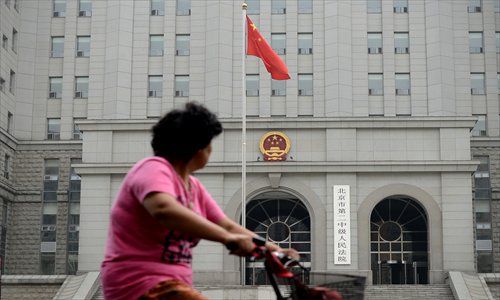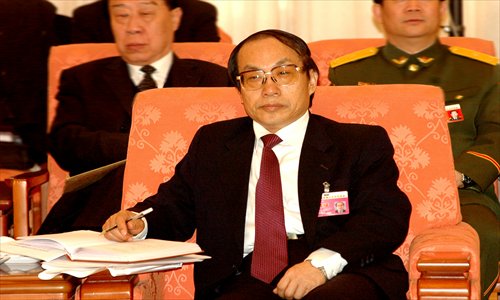Liu gets ‘suspended death’

A woman rides a bicycle in front of a courthouse during the sentencing of China's former railways minister Liu Zhijun in Beijing on Monday. Photo: AFP

Inset: Liu Zhijun Photo: CFP
Former minister of railways, Liu Zhijun, was given a death penalty with "a two-year reprieve" for bribe-taking and abuse of power Monday.
Liu, 60, is the first ministerial-level official to stand trial since the 18th National Congress of the Communist Party of China (CPC) Central Committee last November. An opinion piece by Xinhua said the trial showcased the Central Committee's resolution and toughness in punishing corrupt officials.
The Beijing No.2 Intermediate People's Court handed down the sentence almost 30 months after the former official was dismissed from his post.
The court said from 1986 to 2011, Liu took advantage of his positions first in local railway bureaus and later as the minister of railways, and helped 11 people win promotions, project deals and cargo transportation contracts. He accepted 64.6 million yuan ($10.5 million) in bribes from them during this period.
The court said while he was railways minister, Liu helped businesswoman Ding Shumiao and her relatives to win both cargo transportation and railway construction contracts. He also helped them in the acquisition of shares in a bullet train wheel manufacturing company and with financing enterprises by breaking regulations and applying favoritism.
Bai Shanyun, the judge, told Xinhua that due to Liu's abuse of power, Ding and others raked in more than 3 billion yuan worth of profits, including 374 properties revealed earlier by media.
Of the 64.6 million yuan in bribes taken by Liu, 49 million yuan was spent by Ding to benefit Liu, including buying off officials and others to free Liu of any implication in another corruption case and creating favorable conditions for him to secure a better position.
Bai said the former official should be sentenced to capital punishment as a result of the crime, but a two-year reprieve was given because Liu confessed his crime, including some acts of bribe-taking that were unknown to investigators, and he and his family cooperated with investigators to help locate the illegal gains.
Liu also appeared to be cooperative when confessing and showed his penitence during the investigation, prosecution and trial procedures, Bai said.
During the trial on June 9, Liu wept and said he would accept whatever sentence was handed down by the court.
Liu's lawyer Qian Lieyang Monday confirmed to the China News Service that Liu wouldn't lodge an appeal.
For the public, the suspended death penalty for Liu came as "no surprise," as none of the senior officials, who went on trial for similar crimes in recent years, have received a simple death penalty. A suspended death sentence normally results in a term of long imprisonment rather than execution.
Cao Yisun, a law professor with the China University of Political Science and Law, told the Global Times that it shows the judicial department's decision to gradually phase out the death penalty for economic crimes. "But it doesn't mean we don't need capital punishment for such crime, because it still could serve as deterrence to corrupt officials."
However, the relatively lenient penalty wasn't enough to quell public anger, with many Web users voicing their disappointment online.
Mao Liqun, a lawyer with the Beijing-based Shangquan Law Firm, told the Global Times that the public's dissatisfaction toward Liu's sentence was a reflection of their frustration with rampant corruption.
"The absence of effective supervision means that the country can only rely on harsh punishment to fight corruption. Therefore, a lenient penalty can cause confusion and furthermore frustration among the public over the government's resolution in fighting corruption," Mao said on Monday.
Though the court sentence indicated closure in the high-profile case, the problems for the scandal-ridden railway sector still remain despite Liu's ouster.
During his reign, Liu repeatedly advocated "leapfrog development" of the rail sector, and poured massive investment into building the network, which resulted in 2.66 trillion yuan in debts for the ministry by September 2012.
Zhao Jian, a professor with the School of Economics and Management at Beijing Jiaotong University and long-time critic of Liu, told the Global Times that the debts and refusal to reform were bigger problems left by Liu than his corruption.
"Liu's putting development before reforms resulted in stagnation in the rail sector, which is a huge problem. But he isn't the only one to blame," Zhao said, adding that the authorities hadn't reflected on these issues.
In March, the former railways ministry was dismantled into administrative and commercial arms in a bid to reduce bureaucracy and improve efficiency.
However, Zhao said the authorities stopped short of making clear their next step for reforms, and a partial reform would only "create a monopolized State-owned rail enterprise."
Xinhua contributed to this story